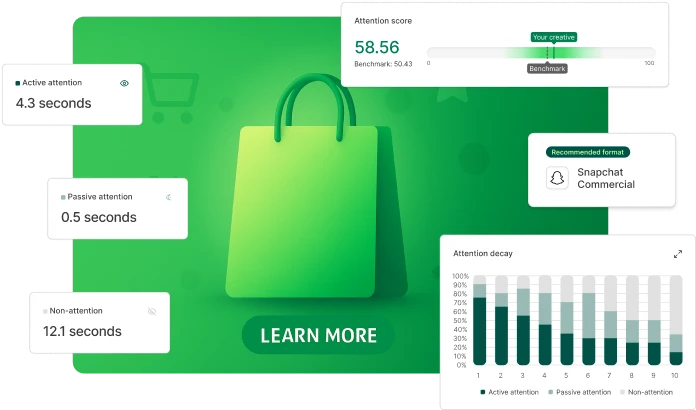How Attention Fuels Mental Availability: The Missing Link Between Media and Memory

Marketers have long known that mental availability, how easily a brand comes to mind in a buying situation, is one of the most powerful drivers of long-term growth. But what’s less understood is how mental availability is built.
The answer lies in attention. Without attention, there’s no memory encoding. And without memory, there’s no recall when purchase decisions happen.
In short: attention is the gateway to mental availability.
Understanding Mental Availability
Mental availability isn’t about awareness in the traditional sense. It’s not whether someone knows your brand exists, but whether they can retrieve it quickly when a relevant need arises.
Many established voices, such as Karen Nelson-Field, in the field of marketing science have shown that brands with strong mental availability are more likely to be chosen, not because of loyalty, but because they’re easier to think of in the moment.
However, mental availability can’t form out of thin air. It depends on how effectively your advertising captures and holds attention long enough to be remembered. That’s where Amplified’s attention data comes in.
Attention as the First Step in the Memory Chain
Amplified’s research, built on over 59 billion human data points and growing, collected from 1.35 million people across 16 countries, shows that attention predicts whether an ad is even noticed, and therefore whether it can influence memory structures.
Here’s how the process unfolds:
- Exposure: An ad becomes viewable on-screen
- Attention: The viewer either looks at it actively, passively, or not at all
- Encoding: If sufficient attention is paid, the ad moves into short-term memory
- Retrieval: Over time, repetition and context strengthen memory links, creating mental availability.
Only steps two and three, attention and encoding, determine whether an exposure becomes an influence.
Our studies consistently show that ads receiving active attention drive up to three times more brand recall and purchase intent than those viewed passively. And ads that receive no attention? They drive nothing, just wasted media spend.
Proof Points: What the Data Tells Us
- Active attention seconds: Are a stronger predictor of mental availability than impressions or viewability metrics
- Attention decay: The drop in focus during an ad, typically happens within the first five seconds. Ads that front-load brand cues or emotion perform significantly better
- Platform environments: Differ drastically. For example, high-attention channels (like premium video) consistently outperform scroll-heavy feeds on memory effects, even at lower reach
- Brand size matters: Large brands extract more return per second of attention, but smaller brands can achieve outsized effects with efficient creative and placement choices.
These findings underline a fundamental truth: not all exposures can be treated the same. Only the ones that earn real attention drive mental availability and, ultimately, growth.
Methodology Behind the Insights
Amplified measures human attention using a mix of eye-tracking, facial mapping and contextual modelling across the likes of digital, TV and out-of-home environments. Each viewing instance is classified as:
- Active Attention: Eyes on screen, deliberate focus
- Passive Attention: Peripheral awareness without direct engagement
- Non-Attention: In view but ignored.
These signals are then modelled to link attention performance with sales outcomes and brand lift. This attention-to-outcome pipeline allows brands to move beyond proxies and measure real human engagement with precision.
From Insight to Activation: How to Build Attention-Led Mental Availability
1. Front-load key assets
Place branding, distinctive assets, or emotional triggers within the first few seconds before attention decays.
2. Use attention-validated creative testing
Test creative concepts for active vs passive attention before launch. A few small tweaks, eye-line direction, pacing or context, can dramatically improve hold.
3. Plan media by attention quality, not just cost
Shift from buying CPMs to buying attentive strength. A smaller audience paying attention outperforms a large one that scrolls past.
4. Balance reach with resonance
Attention-adjusted reach metrics combine scale with attention quality, ensuring that every impression has a meaningful impact.
5. Reinforce consistency
Attention fuels memory, but memory strengthens with repetition. Keep creative cues and brand assets consistent across channels to deepen mental availability.
The Bigger Picture
The advertising industry has overvalued proxies - clicks, viewability, dwell time - while undervaluing what truly matters: human attention.
When brands treat attention not as a soft metric, but as a measurable input into planning, they move closer to what every marketer wants: campaigns that are not only seen but remembered.
Attention doesn’t just fuel mental availability. It’s the foundation that makes brand growth possible.
Ready to get started with attention in your media strategies? Why not take a look at Amplified's self-service creative testing tool or our market-leading planning and live verification platform.
Not all impressions are equal, and reach doesn’t guarantee engagement. Amplified’s Campaign Strategy tools use real human attention metrics to help you predict and optimise media performance before launch.
Your campaign's already live, great. But even the best executions can benefit from a fresh lens. Amplified’s in-flight attention measurement gives you clear, science-backed insights into how your creative and placements are performing while there's still time to level-up results.
Through bespoke research studies, we help brands, agencies and platforms measure attention where it matters most, across TV, social, CTV, DOOH and more. This in-depth research helps you ensure that your media investments are seen, engaged with, and delivering true impact.
Test, refine and optimise with attention-first insights. From creative testing to bespoke data analysis, we help brands, agencies and platforms improve performance.
Amplified offers flexible, API-driven integrations, making it easy to activate real human attention data within your existing platforms and tools. Whether you’re an agency, publisher, platform or brand, our integrations ensure attention insights are directly embedded into your workflow, powering smarter, more effective decision-making.
If you’re looking to take attention beyond a one-off study or standard integration, a partnership with Amplified unlocks exclusive access to research, insights, technology and strategic collaboration that transforms how you measure, plan and execute media.







.webp)
.webp)
.webp)
.webp)
.webp)
.webp)